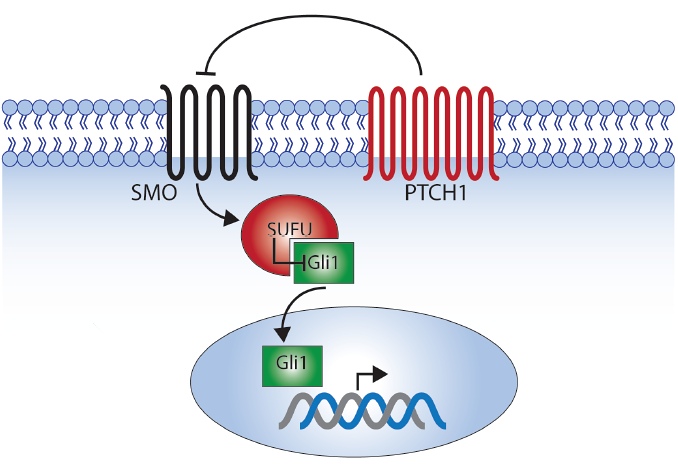Cartilage gene linked to bone cancers

The team also uncovered the Indian Hedgehog pathway that contributes to the development of this bone cancer in one in five patients with the disease. Drugs that inhibit this pathway already exist, and therefore the team’s finding offers potential new treatment options for many patients with this cancer type.
Chondrosarcoma is a cancer of cartilage and is the second most common type of primary bone cancer. The main treatment option is surgery as chemotherapy or traditional radiotherapy provides no significant benefit for patients with this disease. This study offers new approaches to diagnosing this tumour and possible new treatments.
“We’ve looked at the entire genetic landscape of this bone cancer in patients. Our study highlights the importance of thoroughly characterising all cancer types to help develop better therapeutic and diagnostic strategies.”
Dr Patrick Tarpey Joint-first author from the Wellcome Trust Sanger Institute
The team screened the functioning regions of the genome in 49 patients with chondrosarcoma. They found that mutations in the gene COL2A1 played a role in cancer development in almost 40 per cent of the patients.
COL2A1 is the gene for a type of collagen. Collagens are fibrous proteins that are responsible for the tensile strength of bone, cartilage and other tissues. This collagen is particularly important for the development of cartilage and thus the gene is very active in cartilage cells. This is the first time that a collagen gene has been shown to be involved in the development of a cancer. The team speculates that the high activity of COL2A1 in cartilage cells could contribute to the formation of mutations that underlie the development of chondrosarcoma.
The team looked at the activity of COL2A1 in other bone cancers but did not find mutations. The high frequency of mutation in COL2A1 in chondrosarcoma patients could therefore become a diagnostic marker to differentiate it from other bone cancers.
“The frequency and pattern of COL2A1 mutations is very interesting. These patterns suggest selection for variants likely to impair normal collagen biosynthesis.”
Dr Sam Behjati Joint-first author from the Sanger Institute
The team also identified two biological pathways, IHH and RB1 that contributes to the development of chondrosarcoma in many patients. Drugs that target the IHH pathway are already used to treat other cancer types. These drugs could be good candidate treatments for patients with chondrosarcoma.
“Our study has brought us a step closer to understanding fully the biological mechanisms that underlie this bone cancer. This is significant progress that hopefully will lead to more effective approaches to treat this disease.”
Dr Andy Futreal Senior author and honorary Sanger Institute faculty member now at MD Anderson
“Our research would not have been possible without the help of the patients who donated their samples. We hope the ongoing scientific and clinical research being conducted will help improve the outlook for those currently suffering at the hands of this disease.”
Professor Adrienne Flanagan Lead author from the Royal National Orthopaedic Hospital NHS Trust and UCL
More information
Funding
This work was supported by funding the Wellcome Trust, and the Skeletal Cancer Action Trust (SCAT), UK.
Participating Centres
- Cancer Genome Project, Wellcome Trust Sanger Institute, Wellcome Trust Genome Campus, Hinxton, Cambridgeshire, CB10 1SA, UK
- Department of Paediatrics, University of Cambridge, Hills Road, Cambridge, CB2 2XY
- Human Genome Laboratory, Department of Human Genetics, VIB and KU Leuven, Herestraat 49 box 602, B-3000 Leuven, Belgium
- Histopathology, Royal National Orthopaedic Hospital NHS Trust, Stanmore, Middlesex, HA7 4LP, UK
- Department of Haematology, Addenbrooke’s Hospital, Cambridge, UK
- Department of Haematology, University of Cambridge, Hills Road, Cambridge, CB2 2XY
- UCL Cancer Institute, Huntley Street, London, WC1E 6BT, UK
Publications:
Selected websites
RNOH
RNOH is the largest specialist orthopaedic hospital in the UK and is regarded as a leader in the field of orthopaedics.
The Trust provides a comprehensive and unique range of neuro-musculoskeletal healthcare, ranging from acute spinal injuries to orthopaedic medicine and specialist rehabilitation for chronic back pain sufferers.
The Wellcome Trust Sanger Institute
The Wellcome Trust Sanger Institute is one of the world’s leading genome centres. Through its ability to conduct research at scale, it is able to engage in bold and long-term exploratory projects that are designed to influence and empower medical science globally. Institute research findings, generated through its own research programmes and through its leading role in international consortia, are being used to develop new diagnostics and treatments for human disease.
The Wellcome Trust
The Wellcome Trust is a global charitable foundation dedicated to achieving extraordinary improvements in human and animal health. We support the brightest minds in biomedical research and the medical humanities. Our breadth of support includes public engagement, education and the application of research to improve health. We are independent of both political and commercial interests.


